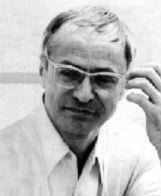

Jean-Pierre Serre was educated at the Lycée de Nimes and then the Ecole Normale Supérieure in Paris from 1945 to 1948. Serre was awarded his
doctorate from the Sorbonne in 1951. From 1948 to 1954 he held positions at the Centre National de la Recherche Scientifique in Paris.
In 1954, Serre went to the University of Nancy where he worked until 1956. From 1956 he held the chair of Algebra and Geometry in the Collège de
France until he retired in 1994, when he became an honorary professor. His permanent position there allowed Serre to spend quite a lot of time making research visits. In particular he spent time at the Institute for Advanced Study at Princeton and at Harvard University.
Serre's early work was to apply spectral sequences to the study of the relations between the homology groups of fibre, total space and base space in a fibration. This enabled him to discover fundamental connections between the homology groups and homotopy groups of a space and to prove important results on the homotopy groups of spheres. Serre's work led to topologists realising the importance of spectral sequences. The Serre spectral sequence provided a tool to work effectively with the homology of fibrings. For this work on spectral sequences and his work developing complex variable theory in terms of sheaves, Serre was awarded a Fields Medal in 1954. Serre's theorem led to rapid progress not only in homotopy theory but in algebraic topology and homological algebra in general.
Over many years, Serre has published many highly influential texts covering a wide range of mathematics. These books are outstanding and led to Serre being honoured in 1995 with the Steele Prize for mathematical exposition.
Serre has received numerous awards besides the ones we have already mentioned. He was elected a Fellow of the Royal Society in 1974, and was also elected to the academies of France, Sweden, United States and the Netherlands. He was awarded the Prix Gaston Julia in 1970 and the Balzan Prize in 1985, He has been awarded honorary degrees from the University of
Cambridge in 1978, the University of Stockholm in 1980, and the University of Glasgow in 1983.